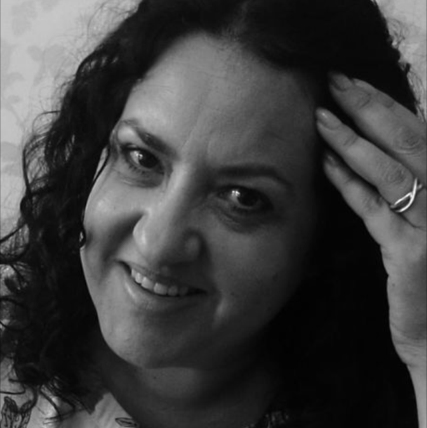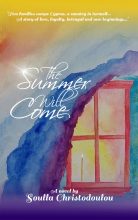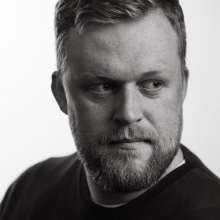The Summer Will Come by Soulla Christodoulou
What led you into writing?
I have always been a writer; as a teenager I kept a diary for years and then throughout my career and various job roles I was the keen employee who willingly took on the “writing” role, you know, the one who volunteered for the newsletter, the up-dating of policies and guidelines and putting together documents to support teaching and learning when I was a teacher.
I enjoy reading and writing and as a child I used to read the dictionary… yeah, geeky I know! But it has helped my writing and being able to express myself both verbally and in the written format is always as advantage whether you’re an author or not.
But it was a loss of control in my life which came to a head in 2012, which pushed me to look for something that would take me away from my job and the confines of my home life. In the end, thankfully, that was a creative writing class which I signed up for in January 2015. Now two published novels later and a collection of poetry, I am still writing and my life has changed a lot to accommodate my love of writing and the realisation that I’m important and I matter and I can be who I want to be, unapologetically.
How does a typical day look?
I don’t have a typical day but I do have days which I set aside for writing when I am not tutoring or working on the edits of other author clients’ manuscripts which I take as commissioned work and fit around my own writing commitments.
Typically I work from around 9.30am, sometimes earlier, and continue until I can’t focus on the screen in front of me anymore! This can be for two hours only, but most often I write, which for me is tapping away at my laptop, for six to eight hours. I usually drink tea as I write and may stop for a break when my eyes need a rest. I write at home and this means I can jump up and fill the washing machine, or load the dishwasher while the kettle is boiling.
I tend to be surrounded by my notebooks, my array of calendars and check lists, mobile phone and other writing tools such as pens, highlighters and printed hard copies of written chapters which I am editing.
In what ways do your characters test your abilities?
Ooh that’s an interesting question…I think it’s about them allowing me to get right into my characters’ heads. It’s not only about understanding the way they behave but also think, feel and react in a given situation. One thing I consciously try to do is make each character’s personality and dialogue unique to them so that my readers don’t feel they are all washed over with the same paintbrush. I think about their little quirks, blemishes, likes and dislikes.
What’s your setup?


Without an office or spare room, I migrate to the dining room to write. And when I say write I mean tap away at my laptop.
The space is south facing and, with double French doors overlooking my back garden, it is always flooded with light and warmth, even in winter. I write at my dining room table which was made to measure with the old table legs found in the loft of my previous home on moving day. A carpenter built the table top from red oak and it’s beautiful.
What lasting effects have your favourite authors had on your writing and style?
I suppose I was a reader before I was a writer and I have read widely and both contemporary and classic authors. My all-time favourite author is Maeve Binchy and the way her stories are warm and cosy… like sitting in front of the fire with a cup of tea, or in the sunshine with a slice of water melon. That’s not to mean her stories are shallow or watered down; they are intense, full of real life and passion, disappointments and heartache, love and friendship. In more recent years I have enjoyed the work of Maya Angelou, Victoria Hislop, Joanna Trollope, Joanne Harris, and of course the classics by Jane Austen, Charles Dickens and so many more I could write a Top 100 Favourite Authors!
What do you do for inspiration?
I live life. I laugh, I cry, I travel, I keep my eyes and ears open and always carry a notebook and pen! I find myself people watching, listening to conversations on the tube, writing down the name of a paint colour or a sentence from a magazine.
What repeating themes do you find yourself pulling into your stories?
Happy endings and romance…what would this world we live in be without a little love? I also like to pull apart relationships and look at what makes people tick, do what they do, their fears, their hopes, their intentions and their behaviour in relation to their loved ones, friends and family.
How do you wind down?
I read, I spend time with my family and friends and sometimes just sit and think; in a world full of noise and interruptions it’s good to be able to just “be”. Last year I travelled around India for three and a half weeks and spending time in Varanasi on the River Ganges was truly inspiring; the colours, the sounds, the smells – everything spoke to me and I would love to go back.
What sort of challenges do you regularly overcome while world-building?
I don’t know that I face any challenges with world-building because I do a lot of research surrounding the worlds I am building. For example, my second novel is set in 1950s Cyprus and London and my research took me not only to the history books of this period but I read many memoirs and blog posts about this period; language, products, life style, clothes, family, culture, etc. One reviewer commented, ‘The author brilliantly conveys the contrast between their life in Cyprus and their experience of London. There are obvious things like the cold weather and different food. ‘She felt like she was always shrouded in grey; she could barely see the buildings, the streets, the sky, the landscape from a few hundred yards away.’ But also less obvious things, such as the dirty, dingy housing, the multi-racial nature of London and the noise. “It was not the peaceful sound of the lapping waves of the sea in Limassol. No, it was a different world, a noisy one.’ And they find it difficult to adjust to the different pace of life as well. ‘Loizos noticed how those around him seemed to be in a hurry to get somewhere; a complete contrast to life in Cyprus, or at least life as it used to be before the Cyprus tragedy, with trundling buses, slow donkeys and hours spent in the kafenion.” and ‘I loved the little details like the families’ surprise that in England olive oil is only available from a pharmacist! There’s a lovely sense of the atmosphere of the 1950s – the fashion, the music and things like the opening of the first Wimpy Bars!’
In my current WIP I would say my character-building is more testing as for example, my main character has Cerebral Palsy and is spastic in both legs. I have carried out research across a number of websites as well as interviewed someone with the condition several times. His insight has been invaluable. What is a straight-forward act for a normal able-bodied person is quite a struggle for someone with CP and so I have had to put myself in his shoes and have him react and behave in a way which is dictated to him by his condition.
What’s the most useful advice you could give to an aspiring author?
Read and write as much as you can… join a creative writing group or critique class and listen to feedback with objectivity. Don’t take anything personally and use everything you learn to develop and improve your writing. Writing is something which improves with practise so keep writing. I would also say be comfortable with what you are writing. I write from the heart, from experience, from getting inside the heads of my characters; it’s not about the clothes they wear but why they choose to wear the clothes they do. It’s not about their favorite meal out it’s about why they don’t eat fish and what their favourite cooked vegetable is, even if you don’t mention it in the story. It’s just as much about what you don’t say as what you do.
I would also say build your tribe on social media BEFORE your book is released. Connect with other authors and readers, bloggers, publishers, writing groups and book clubs. Be vocal about what you’re doing and be sure to be honest and open. We all like to connect with real people so be positive, and forward-thinking, engage and be supportive of those already ahead of you in the writing journey.
Tell us about the book you’re promoting.
I’d like to promote The Summer Will Come with you and your readers Mike. It’s my second novel and I would describe it as a modern historical fiction novel set against the backdrop of 1950s Cyprus and London. The story follows the lives of two families and is written from the POVs of Elena and her mother, Evangelia, and Christaki and his father, Loizos. The atmosphere is one of rising tension and fear on the island as families and communities are split; supporters of the nationalist organisation EOKA risk arrest, internment, interrogation (and potentially worse) by the British authorities as they smuggle coded messages and hold secret meetings. It’s a time of curfews, informers, repression and often violent reprisals.
Eventually both families are forced to leave the cloying heat of Cyprus to seek a new life in a multi-cultural England. They fear the isolation of moving to a new country, with foreign habits and different cultures, and struggle to find a place to call home amidst the chaos but connections within the Cypriot community unites two members of the families together and brings the story to a happy ending.
👋 Hi! I run Author Interviews
As a new writer I found myself itching to contribute to a thriving, creative community, so I made Author Interviews and I've met loads of wonderful people in the process. You can buy my debut fantasy RINGLANDER: THE PATH AND THE WAY from Amazon.





